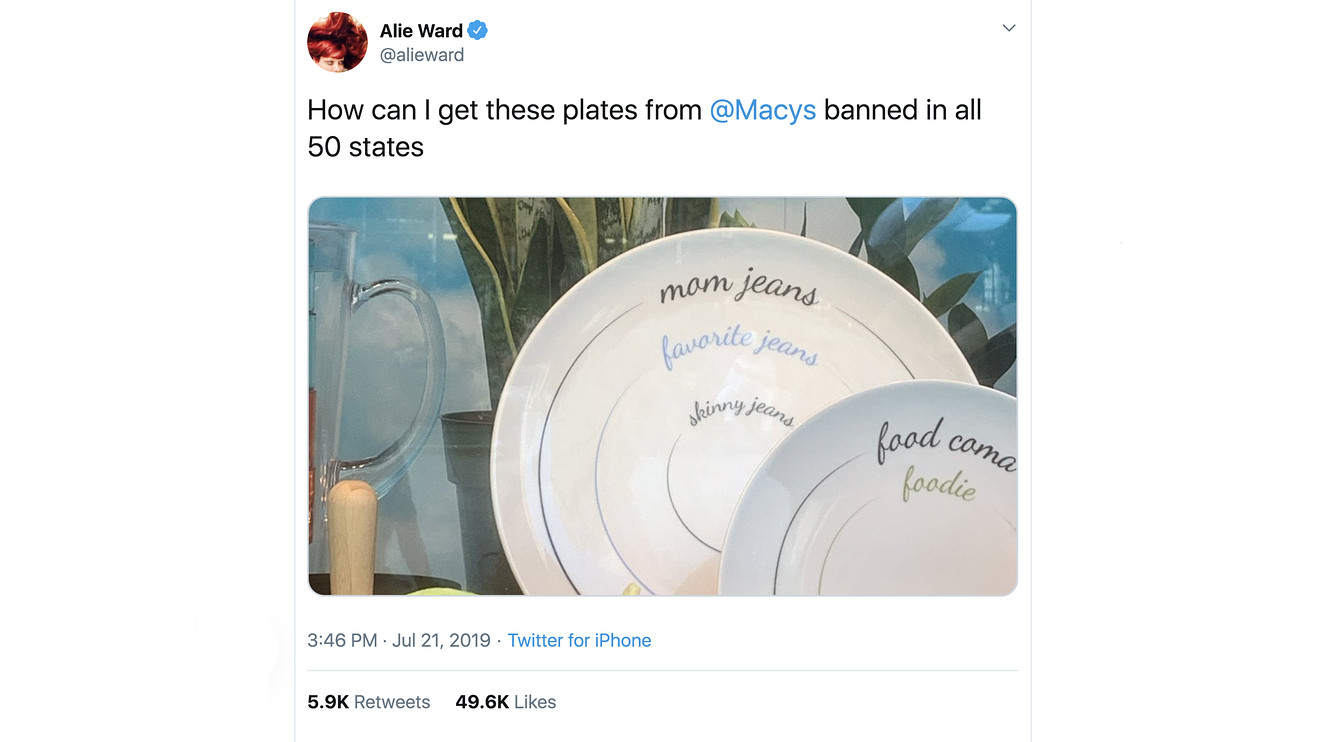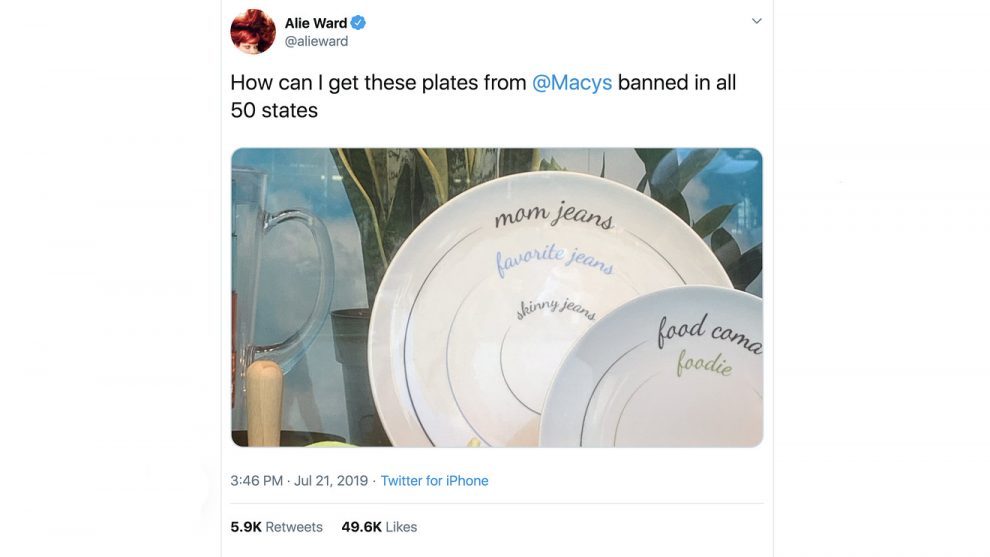
Now this was in poor taste.
Both Macy’s M, -2.24% and Forever 21 have been backpedaling from accusations of body-shaming this week.
Writer and CBS CBS, +0.04% correspondent Alie Ward called out Macy’s in a Sunday tweet for selling plates printed with three concentric circles that outlined portion sizes, with “skinny jeans” in the smallest ring, and “mom jeans” in the widest one. Her tweeted photo with the caption “How can I get these plates from Macy’s banned in all 50 states” has drawn almost 6,000 retweets, and the thousands of comments include many complaints along the lines of this one: “Macy’s just casually promoting eating disorders and body shaming.”
Macy’s, with shares down 22.7% from the start of the year, responded to Ward directly on Twitter TWTR, -1.02% that very night, noting that it was removing the plate, and writing that, “[we] agree that we missed the mark on this product.”
Forever 21 has also had to apologize for offending customers this week after it packed low-carb Atkins bars in their shipments. Several shoppers accused the retailer of including the unsolicited diet products in online orders for plus-size clothing in particular, although the company confirmed to Shape that the SNC-Lavalin-owned SNCAF, +1.96% Atkins bars went to all online customers as a free test product. The retailer added in a statement that it has removed the bars from future packages, and “we sincerely apologize for any offense this may have caused to our customers.”
Still, shoppers of all sizes complained on social media, calling the brand “fatphobic” and suggesting the unsolicited diet bars could trigger someone with an eating disorder.
Now, both of these companies have certainly made efforts to become more size-inclusive, such as Macy’s increasing its plus-size apparel lines by 20.4% in 2018, and carrying a selection of clothing styles up to a size 24W. Forever 21 expanded its plus-size styles in 2017, including teaming up with plus-size model and body activist Lulu Bonfils.
So after these stores have reached out to plus-size shoppers — which is where most U.S. women fit, by the way, as 68% of them wear a size 14 or above — many customers and body activists were disappointed to see these brands and others can still have such a body image blind spot at times.
“Companies, I think, are really in this interesting place where they’re trying to capitalize on this bopo (body positive) movement, but doing it ‘safely’ … (because) our entire culture here in the U.S. is incredibly fat-phobic still,” Jes M. Baker, an activist in the body positive movement and creator of The Militant Baker blog, told MarketWatch.
Indeed, research has shown that overweight and obese people are stigmatized at work, where they are less likely to be hired, promoted or given a raise, yet more likely to be fired, because of their weight. They also face bias from health care professionals, who are more likely to characterize obese patients as weak-willed and lazy. So the body positive movement has pushed for acceptance and health at every size, as well as getting society to recognize humans are not created in one homogenous sample size, by showing more size diversity in advertising, in the fashion industry and on designer runways, as well as in movies and on TV.
But it’s only been able to go so far. For instance, many plus-size models are only “ever so plus-size,” Baker noted. They are a size 10, 12 or 14, whose figures still mirror the “ideal” body by having “a Coke-bottle shape where it kind of nips in at the waist,” she said, rather than showing someone who is a size 20. So brands are in an awkward position of trying to draw in plus-size customers without driving away shoppers who have been conditioned to only accept and desire models who conform to a certain (thinner) beauty standard.
“Let’s not pretend that large corporations are out to heal the world; they’re there to sell a product,” said Baker. “And anything ‘too large’ is still terrifying to a majority of people, which is a shame.”
Related: This new clothing app is the Poshmark for plus-size women
And that’s how these high-profile faux pas happen. Because Macy’s and Forever 21 are not the only brands put on blast for products and promotions viewed as being offensive to the plus-size community — or worse, encouraging poor body image or possible eating disorders. After all, 70% of adults ages 18 to 30 don’t like their bodies, and 80% of girls have dieted before they turn 17.
Last fall, online designer clothing shop Resolve was slammed for selling a sweatshirt from designer LPA that read, “BEING FAT IS NOT BEAUTIFUL IT’S AN EXCUSE,” which was part of a collaboration with “Girls” actress and director Lena Dunham that meant to take a stance on cyberbullying by highlighting quotes from prominent women like Dunham who have suffered internet trolling and abuse.
It did not go over well.
Revolve also apologized and pulled the offensive sweatshirt.
And Dove, the Unilever-owed UN, -2.27% beauty brand celebrated for embracing body diversity with its Real Beauty Campaign, offended customers in 2017 by releasing seven limited-edition body washes with bottles supposedly shaped like women’s bodies — including long and slender containers, short and squat containers, and some hourglass shapes. “It reduces you down to yet another label,” Dr. Jayme Albin, who addresses body image and dysmorphia in her practice, told MarketWatch at the time. “Even if I don’t have body issues, now I’m looking at these bottles and thinking, ‘Am I a pear shape? Am I an apple shape? What am I supposed to be?’
Advertising campaigns also often miss the mark. Earlier this year, “The Good Place” star and body activist Jameela Jamil called out Avon AVP, -0.39% for printing a brochure that featured a laughing woman and the text, “Dimples are cute on your face (not on your thighs).” (While she specifically addressed Avon’s U.K. branch, the company told the HuffPost that the ad appeared in a North American brochure, too.)
“And yet everyone has dimples on their thighs, I do, you do, and the clowns at @Avon_UK certainly do,” she wrote. “Stop shaming women about age, gravity and cellulite.”
Avon’s U.S. Twitter account responded that the ad was supposed to be “light hearted and fun, but we realize we missed the mark,” adding that it removed the message from all of its marketing materials.
And just last week, U.K. fitness studio F45 Training came under fire for sending an email promo for an eight-week fitness challenge that asked customers if they were “Feeling fat and fugly?” A billboard for a Philadelphia cosmetic surgery firm has also recently caused plenty of frown lines by featuring a thin, attractive woman in a bikini with the tagline, “Keeping our beaches beautiful,” which implied that non-“beautiful” people didn’t belong on the beach.
“I think the public is pushing boundaries incrementally. I wouldn’t say there’s been radical change, but there’s a little bit more of an awareness that we have larger bodies, that there is diversity in bodies,” said Baker. And the internet and social-media sites like Facebook FB, -1.93% and Twitter have been powerful tools for members of the body positive movement to find each other, to organize and to speak up when they see something offensive.
“Companies are kind of forced to listen, because that communication online really does affect them financially,” said Baker.
And considering the U.S. women’s nonstandard-size clothing market, which includes plus size and extra small apparel, is a $21 billion market with the potential to reach $60 billion by 2020, according to Coresight Research, this is not a group that any brand should want to push away.












